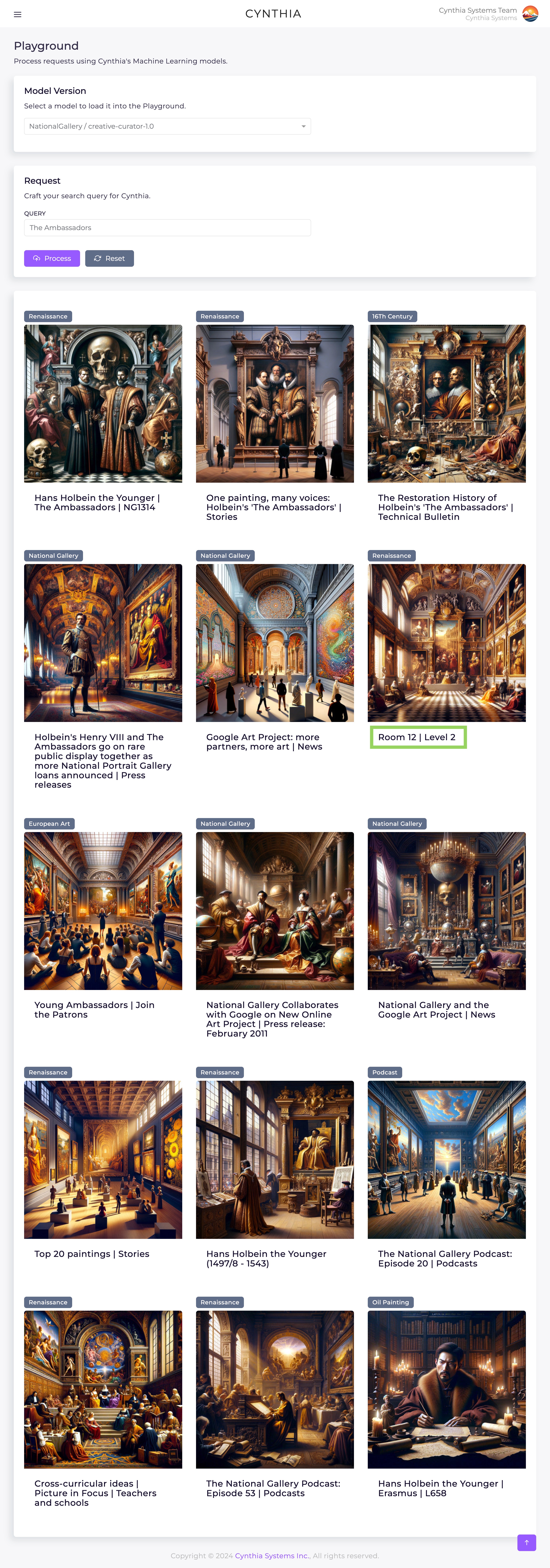
Cynthia Systems on Friday, August 2, 2024
In the ever-evolving landscape of digital art exploration, the need for precise, comprehensive, and trustworthy search capabilities has never been more critical. As cultural institutions like the National Gallery in London strive to make their vast collections more accessible, the limitations of traditional search engines become increasingly apparent. Enter Cynthia, a revolutionary cognitive search system that's setting new standards in digital art discovery. This blog post delves into how Cynthia's advanced AI capabilities are transforming the way we interact with and understand art in the digital realm.

When tasked with finding a "royal portrait" in The National Gallery's collection, the stark contrast between traditional search methods and Cynthia's cognitive approach becomes immediately clear.


In a direct comparison with Perplexity AI, another leading search solution, Cynthia's superiority becomes starkly evident, particularly in the realm of accuracy. A critical error in Perplexity's results highlights the dangers of relying on generative AI models and next-token predictors. Perplexity incorrectly states that Holbein's "The Ambassadors" is displayed in Room 2 of the National Gallery.

In contrast, Cynthia accurately reveals that the masterpiece is located in Room 12 on Floor 2. This discrepancy is not merely a minor detail; it underscores the potential for misinformation and confusion that can arise from AI-generated content. While Perplexity offers a surface-level overview, Cynthia delivers a comprehensive, multifaceted exploration of the topic that is both deeper and more trustworthy. This level of accuracy is crucial in the realm of AI ethics, where the dissemination of correct information is paramount.

Cynthia represents the vanguard of site search technology, offering a glimpse into a future where deep, truthful knowledge access is the norm. Unlike monolithic, one-size-fits-all solutions like Perplexity or Google Gemini, which often provide shallow and sometimes erroneous results, Cynthia tailors its search capabilities to the specific content and context of each site it serves. This specialized approach ensures a more accurate, relevant, and enriching user experience, paving the way for a new era of digital exploration.

As we stand on the cusp of this new era in digital search and discovery, the opportunity for businesses and thought leaders to revolutionize their online presence is unprecedented. By adopting Cynthia's cognitive search capabilities, organizations can offer their users an unparalleled depth of knowledge access, fostering engagement, learning, and discovery in ways previously unimaginable. We invite forward-thinking institutions and businesses to join us in shaping the future of digital exploration, where every search becomes a journey of discovery, and every user interaction is an opportunity for profound understanding.

As we conclude our exploration of Cynthia's transformative impact on art discovery, let's turn our attention to a universal theme that has inspired artists for centuries: love. When tasked with searching for "Love" within the National Gallery's collection, Cynthia once again demonstrates her unparalleled ability to curate a rich, multifaceted tapestry of results. From Renaissance masterpieces like Titian's "Love, Desire, Death" series and Botticelli's "Venus and Mars," to 18th-century works like Fragonard's "The Fountain of Love," Cynthia weaves together a comprehensive narrative of love's representation in art across epochs and cultures. The search results encompass not only paintings but also exhibitions, scholarly articles, and educational resources, offering users a holistic understanding of love's enduring presence in art history.

This depth and breadth of results underscore Cynthia's capacity to transform a simple query into a journey of discovery, inviting users to explore the myriad ways artists have grappled with and celebrated the concept of love throughout the ages. In doing so, Cynthia doesn't just facilitate art discovery; she opens windows into the human experience, fostering a deeper appreciation for the universal themes that connect us across time and culture.